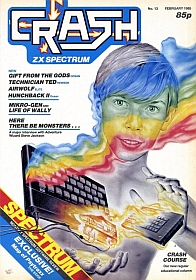
Generally known as 'The Spectrum Kid', this cover used colour more ambitiously than any of its predecessors. Oliver was keen on painting an almost abstract subject, the wondrous thrill of a newcomer to the Spectrum (there were always many more after Christmas), wide open to its magic and mystery. It's a simple piece of symbolism, the Spectrum colours animating the otherwise grey, ethereal figure - yet the delicacy of the painting seems to illuminate the whole cover so that it adds up to more than the sum of the parts; there's really nothing here tied to any game.

Even game maps had become the subject of exclusivity! Witness the cover flash for Psytraxx from The Edge. Exclusive maps were, and still are, a rather daft notion. But by this point magazines would slap 'exclusive' over anything that could be drawn within hours of a preview copy's arrival to beat a rival magazine's carefully negotiated 'official' map.
The good turn Elite unwittingly did CRASH, which I mentioned earlier in the CRASH history, was concerned with its game Airwolf. This was to be a TV tie-in in reverse. Elite sent the Birmingham-based Central TV news desk a press release about the youthfulness of Airwolf's programmer (actually Richard Wilcox, young, but not quite the spring chicken the release made him out to be!). Central rang Roger Kean to double-check whether this was commonplace, and whether Airwolf actually was a hit game. Roger told the researcher that he would have to consult his school-age reviewing team, a statement calculated to arouse Central's interest.
The thought that a bunch of mere schoolkids was passing judgement on games which would then affect large companies' sales - and all this from the obscure town of Ludlow - was irresistible.
Next day, a four-man Central TV crew arrived in Ludlow to interview Matthew Uffindell, Ben Stone, Robin Candy and Roger Kean. The TV reporters wanted to have the CRASH reviewers playing Airwolf and chatting about it. Unfortunately it was left to Robin to say why he thought it was a hit, and because he was the only person on the team who really didn't like the game much he was largely cut out from the edited programme, as was Airwolf. But CRASH appeared the following evening, December 19, on Central News in a five-minute piece.
Also that month Legend gave us The Great Space Race, leaving most reviewers undecided as to whether it was the biggest disappointment of all time or the biggest hoax. Large shipments hit the shelves before the reviews - and then the sales died. Sometimes, justice does prevail.
All magazine publishers were concerned that the Government would levy 15% VAT on magazines in the April Budget. Periodicals and books had always been zero-rated, and there were gloomy prognostications that such a tax would mean most magazines would have to increase their cover price to stay afloat financially, and thus lose readers. All this led Roger to predict in his editorial the death of some computer titles.
In the event magazines were left alone by VAT, but several titles would still close, as the computer-magazine market, safely sailing for three years, entered a period of great change in the wake of CRASH's quirky success.
An early software casualty of 1985 was Fantasy, whose Backpacker's Guide To The Universe had failed to hit the mark. Fantasy released Drive In, a reasonably-rated yet nevertheless disappointingly derivative game, and then, as everyone awaited news of the sequel to Backpacker's, simply vanished from the face of Cheltenham, leaving debts and confusion.
On the brighter side, Hewson scored a Smash with Technician Ted, a surprise to many outsiders, who considered the game nothing more than a competent Jet Set Willy clone. The CRASH team just loved it, though. Of course there was also Airwolf (Candy excepted) and Firebird's first full-price (Gold Range) game, Buggy Blast - a 3-D shoot-'em-up bettered since, but impressive then.
Derek had some thrills too: Doomdark's Revenge proved to be even better than its predecessor, Lords Of Midnight, making programmer Mike Singleton one of the most praised people in the business.
And I shouldn't avoid recalling that, to our shame, this issue also reviewed Jon Ritman's Match Day, failing to Smash it - we've never been allowed to forget that! And Robin Candy's never forgotten Issue 13 either, for this was his first as Playing Tipster, complete with cute little curly-haired photograph. He loved the fame, hated the photo and it has dogged him since - serves him right too.



